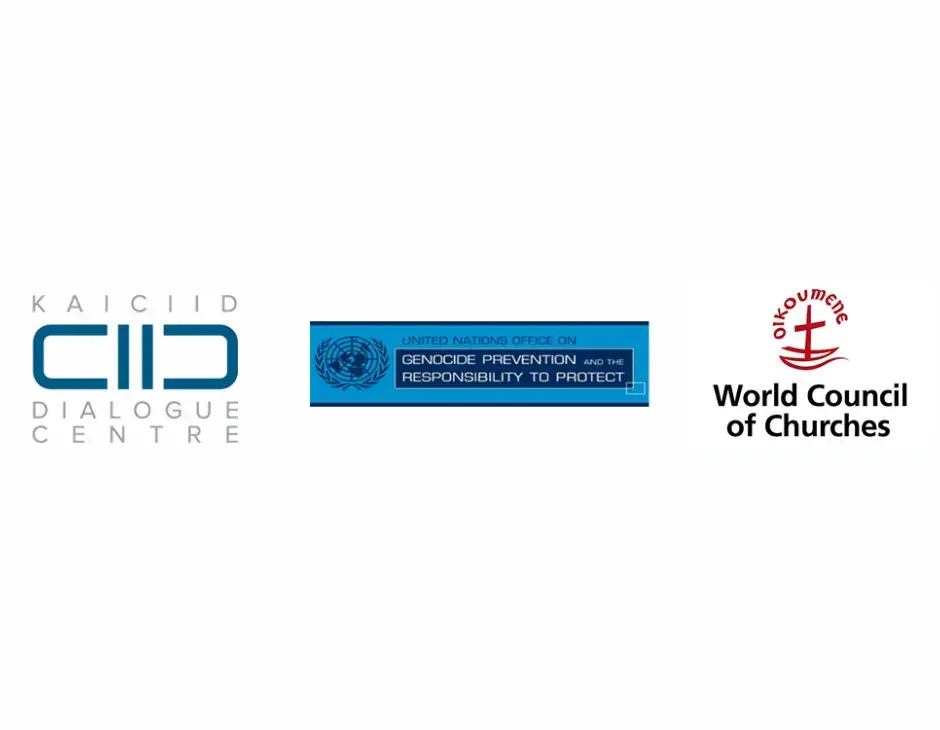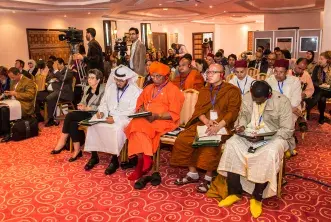Asia-Pacific Religious Leaders Meet to Develop a Strategy for the Prevention of Incitement to Violence that Could Lead to Atrocity Crimes
08 December 2016, Bangkok – Religious leaders from across the Asia-Pacific region met in Bangkok on 6 and 7 December to develop a regional strategy for the prevention of incitement to violence that could lead to atrocity crimes. Religious leaders and actors from thirteen countries took part in the meeting from the Bahai, Buddhist, Christian, Hindu, Jewish and Muslim faiths. The meeting was organised by the United Nations Office on Genocide Prevention and the Responsibility to Protect in collaboration with the International Dialogue Centre (KAICIID) and the World Council of Churches (WCC).
This was the fifth and last regional meeting of the “Fez Process”, an initiative led by the United Nations Office on Genocide Prevention and the Responsibility to Protect in partnership with KAICIID, the WCC, the Network of Religious and Traditional Peacemakers and Member States. Each regional meeting has resulted in context specific strategies for the prevention of incitement to violence that could lead to atrocity crimes, based on a review of the Fez Plan of Action, a plan of action developed by religious leaders from around the world at an initial meeting in Fez, Morocco, in April 2015. The results of the five regional meetings will inform the final version of the Fez Plan of Action, which will be launched at the United Nations headquarters in New York in early 2017.
As is the case in all regions of the world, religion has been manipulated for political reasons in the Asia-Pacific region to incite violence and, in the worst cases, atrocity crimes. “While religious leaders can be part of the problem, we have seen how they can also be part of the solution,” stated Adama Dieng, United Nations Special Adviser on the Prevention of Genocide. “Religious leaders can be – and have been - extremely effective in reducing tensions and preventing violence. Their authority and capacity to influence their followers is unique.”
Along the same lines, Prof. Mohammed Abu-Nimer, Senior Adviser at KAICIID Dialogue Center stated: “The results of this meeting, especially the detailed action plan developed by the participants, is impressive and reflects the strong commitment to jointly confront hate speech and incitement.”
Moreover, Bishop Duleep de Chickera, WCC representative, noted how the Asia-Pacific region “is today dangerously influenced by hatred and division […] Some of this is caused by religion.” Bishop De Chickera called on participants to join hands to counter incitement to violence.
The plan of action developed during the meeting set out a range of actions that religious leaders from the Asia-Pacific region can take to prevent incitement to violence. They include:
- Promote respect for fundamental human rights and principles,
- Encourage inter-religious collaboration on religious and non-religious issues,
- Prevent and counter hate speech and incitement to violence,
- Engage with the community and youth,
- Strengthen collaboration with traditional and new media, and
- Education.
The Plan of Action also includes recommendations to States, the United Nations and the Association of South-East Asian nations (ASEAN), as well as to new and traditional media.
For more information or interview opportunities please contact:
- Simona Cruciani Political Affairs Officer, United Nations Office on Genocide Prevention and the Responsibility to Protect, cruciani@un.org, +1-917-367-5430
- Mariela Hoyer Starcevic, Public Affairs Officer, KAICIID: mariela.hoyer@kaiciid.org, +43 664 887 24068
- Marianne Ejdersten, WCC Director of Communication: mej@wcc-coe.org, +41 79 507 63 63.
Washington, DC -- During a two-day conference hosted at the United States Institute of Peace, on 29 February and 1 March,…
Fez, Morocco, 24 April 2015- Participants at the Forum with religious leaders organized by the…

The role of religious leaders and faith-based organizations in the prevention of atrocity crimes was the focus of discussion…



![The Role of Religious Leaders in Preventing Incitement that could lead to Atrocity Crimes [file:field-file-image-alt-text]](/sites/default/files/styles/project_image/public/img_4414_copy_2_0.jpg.webp?itok=Cq1-qCbE)
![KAICIID Sr. Adviser Prof Abu-Nimer speaking at meeting at the United States Institute for Peace on role of religious leaders in preventing atrocity crimes. Photo: KAICIID [file:field-file-image-alt-text]](/sites/default/files/styles/cards_360_270_scale_crop/public/ccz6froukaaetht.jpg_large.jpg.webp?h=77a6878b&itok=s3pc1xG8)
![Fes Plan of Action [file:field-file-image-alt-text]](/sites/default/files/styles/cards_360_270_scale_crop/public/img_4414_copy_2_1.jpg.webp?h=81d80e70&itok=yU5TYiXY)